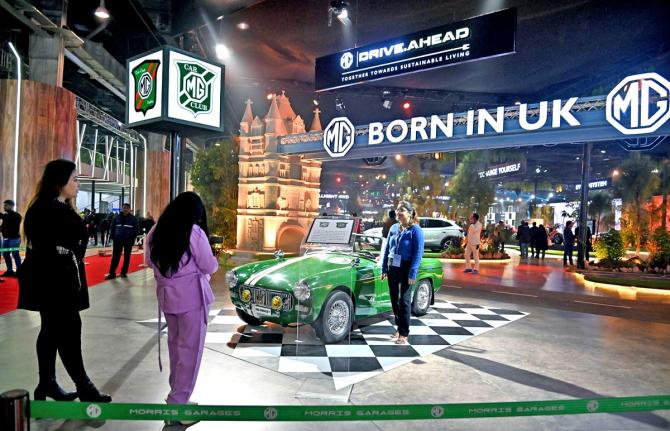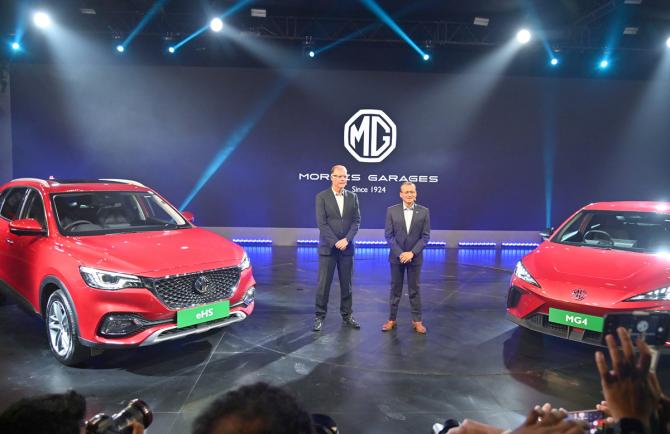'If it is your second car (electric vehicle), you typically keep it for travel within the city.'
'And the first car (internal combustion engine-run vehicles) can then be used to travel to some other cities.'

MG Motor India expects to sell about 80,000-100,000 units, marking a growth of about 70-80 per cent, in 2023 due to the introduction of a new electric vehicle priced between Rs 10 lakh-Rs 15 lakh, improved semiconductor chip supply and high demand for existing products, said its President and Managing Director Rajeev Chaba on Wednesday.
MG Motor India increased its sales from about 40,000 units in 2021 to about 50,000 units in 2022.
"In 2022, the growth was stifled due to the shortages of chips. This year, we are hoping that our supply should improve from the chips' perspective. Also, we have launched facelifted Hector and we are launching another EV (in 2023)," Chaba told Business Standard.
The company is showcasing seven new energy vehicles -- four EVs (including MG4) and three hybrids (including MG EHS) -- at the Auto Expo 2023, Chaba added.
"We are evaluating all the cars and one of these cars will be launched next year," he said.
"We are not Hyundai and Maruti. For a company of our size, if we are able to launch one new vehicle per year, that is good," Chaba said.
When asked if an EV priced below Rs 10 lakh could be launched for the Indian market, he replied: "Some players may be planning that. As far as we are concerned, we are taking a step at a time. So, right now, we are going for a price segment that is between Rs 10 lakh-Rs 15 lakh and that will be quite low in my opinion."
Tata Motors launched Tiago EV, India's most affordable electric car, in September last year at an introductory price of Rs 8.49 lakh (ex-showroom).
"We are expecting our growth to be anywhere between 70-80 per cent growth this year. Our volume should grow up to 80,000-100,000 cars this year," Chaba said.
MG Motor sells brands such as Gloster, Astor, Hector and ZS EV in India.
Talking about the company's plant in Gujarat, Chaba said massive changes have been done last year to increase its production capacity from 70,000 units per year to about 120,000 units per year.
"We are still making more enhancements and improvements and re-layout certain areas. So, hopefully, by the end of this year, we can take the capacity to up to 135,000-140,000 units per year," he mentioned.
What kind of investment would this expansion need in 2023? "It is difficult to quantify, but is obviously in the hundreds of crores because it is not only the capacity enhancements but also the localisation, the new product launches, etc. We will be investing in all that on a yearly basis."
MG Motor India's component supply is going as usual and it has not been impacted as yet due to the resurgence of COVID-19 in China, he said.

The company sold about 5,000 units of its only electric car, the ZS EV.
"We should double ZS EV's sales this year," he said, adding that the waiting period currently for ZS is about 3-4 months.
Regarding chip supply, he said the situation has improved for sure.
"One can not say that supply will be 100 per cent okay (this year). There are still some disruptions. It is an allocation issue also from the chip manufacturer," he said.
Out of about 3.8 million passenger vehicles sold in India in 2022, only about one per cent were EVs.
"This year, it will probably become 2.5-3 per cent. It has the potential to become 7-8 per cent by 2025."
"It will accelerate further between 2025 and 2030 as more and more EVs will come from all car companies so it may go anywhere between 15-25 per cent. It all depends on the number of entries. Consumers will become more and more ready to drive EVs," he added.
Chaba said the charging infrastructure is evolving in India.
"The fact is that more than 95 per cent of the consumers are charging their cars right now at their homes. Globally too, more than 90 per cent of the consumers charge their electric cars at home."
"If it is your second car (electric vehicle), you typically keep it for travel within the city. And the first car (internal combustion engine-run vehicles) can then be used to travel to some other cities."
"It may take time for the EV to become your only car," Chaba said. "Right now, it is an additional car in the family."
Feature Presentation: Rajesh Alva/Rediff.com












 © 2025
© 2025